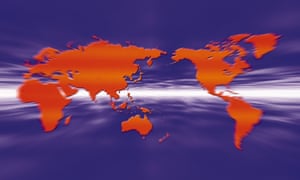Commission for the Human Future, led by John Hewson, says coronavirus
crisis is right time for world to look at catastrophic risks
Governments should use the urgency of the Covid-19
pandemic to address 10 potentially catastrophic threats to the survival
of the human race, according to a report by a collection of prominent
Australian researchers and public figures.
The report by a group called the Commission for the Human Future identifies a list of risks to life on the planet including pandemic disease, climate change, environmental decline and extinction, and overpopulation.
It says the coronavirus pandemic is the right time for countries to
consider how they will address these major challenges that have the
potential to cause widespread social, environmental and economic
disruption. It argues they are interconnected and must be solved
simultaneously and “in ways that make none of them worse”.The report by a group called the Commission for the Human Future identifies a list of risks to life on the planet including pandemic disease, climate change, environmental decline and extinction, and overpopulation.
The Commission for the Human Future is an organisation of researchers and citizens focused on global challenges for humanity, including ecological collapse, food insecurity and war and conflict. It was established following a workshop on existential risks held by the Australian National University in 2017 and its members include the formal Liberal party leader John Hewson, who is its chair, public health academics Sharon Friel and Bob Douglas and the climate scientist Mark Howden.
The report, published on Wednesday, is the outcome of its first roundtable. Hewson said the global pandemic had brought other risks to civilisation into sharper focus and showed how “vulnerable and unprepared” societies were.
“At present, no government in the world has a plan for meeting all these risks, for dealing with them as a total system and for finding the best and safest way out of them,” he said. “This lack of preparedness means humanity will continue to be ambushed by unforeseen crises.”
The 10 threats are climate change, environmental decline and extinction, nuclear weapons, resource scarcity (including water scarcity), food insecurity, dangerous new technologies, overpopulation, chemical pollution, pandemic disease, and denial and misinformation.
“What our species does about these 10 existential threats in the next few years will determine whether present and future generations face a safe, sustainable and prosperous future or the prospect of collapse and even extinction,” the report says.
“It is a choice we all must make, together.”
It argues each problem can be addressed by societies working together and proposes a range of solutions including a ban on nuclear weapons, minimum emissions reduction targets of 50% by 2030, a ban on any new fossil fuel projects, universal laws that protect wildlife and endangered species, a shift to a renewable global food system, and efforts to tackle the influence of vested interests on governments.
The report says the Covid-19 pandemic presents an opportunity to “rethink society” and the impact humans are having on the planet. It says there is need for widespread policy reform and a focus on building societies focused on natural and ecological security, rather than looking at economic growth as the key indicator of success.
Dr Arnagretta Hunter, the inaugural ANU fellow for the human future and a commission board member, said that while the threats were “grim”, the report had a message of hope.
“We can turn things around if we can get the right people out in the front, giving the right messages – if we clearly understand the nature and causes of the risks, devise integrated solutions and take early action to defuse them.”

No comments:
Post a Comment